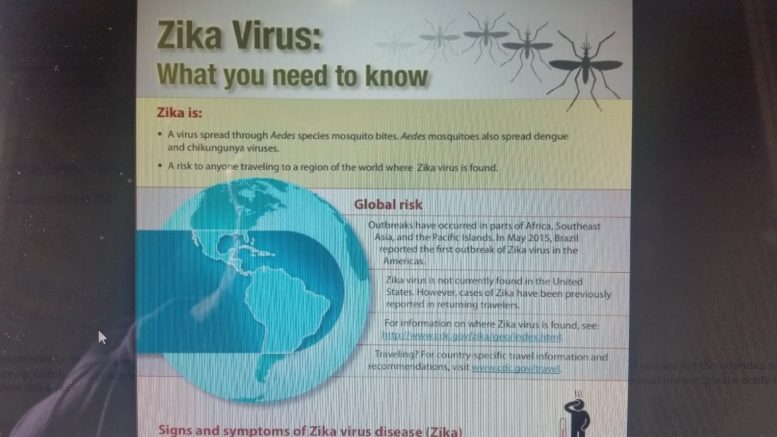By JAN LARSON McLAUGHLIN
BG Independent News
Women who are pregnant, or intending to get pregnant, are being advised to restrict their travel to avoid the Zika virus.
The Wood County Health District is following CDC instructions and suggesting travel to the Caribbean, Central America and South America be avoided for pregnant women.
No vaccine exists for the Zika virus, which has been connected with cases of microcephaly (small heads with incomplete brain development) in infants. Anyone with concerns about traveling can check out the CDC’s website for any travel health notices at http://wwwnc.cdc.gov/travel/notices
In December 2015, Puerto Rico reported its first confirmed Zika virus case. Some Zika cases have been reported by people returning to the U.S. from international travels, but the virus has not yet been transmitted in the U.S.
“There is no evidence anyone that has Zika in the U.S. got it in the U.S. They all traveled to other areas,” said Pat Snyder, of the Wood County Health District.
The virus is spread by mosquitoes. But according to Snyder, the type of mosquito known to transmit Zika is rarely seen in this region.
“It’s not too common in Ohio,” she said. “That doesn’t mean that couldn’t change.”
The virus is primarily a concern for pregnant women.
“Most people inflicted with the virus have no symptoms,” Snyder said.
The most common symptoms of the Zika virus are fever, rash, joint pain, conjunctivitis (red eyes), muscle pain and headaches. The illness is usually mild, lasting for several days to a week.
People traveling to areas where the virus has originated should take precautions, according to the health district. Mosquitoes that spread Zika virus bite mostly during the daytime. So people are advised to use insect repellents, and wear long-sleeved shirts and long pants if weather permits. They are also advised to use air conditioning or window/door screens to keep mosquitoes outside, or sleep under a mosquito bed net if necessary.
General Zika Info: http://www.cdc.gov/zika/
Fact Sheets: http://www.cdc.gov/zika/fs-posters/index.html

